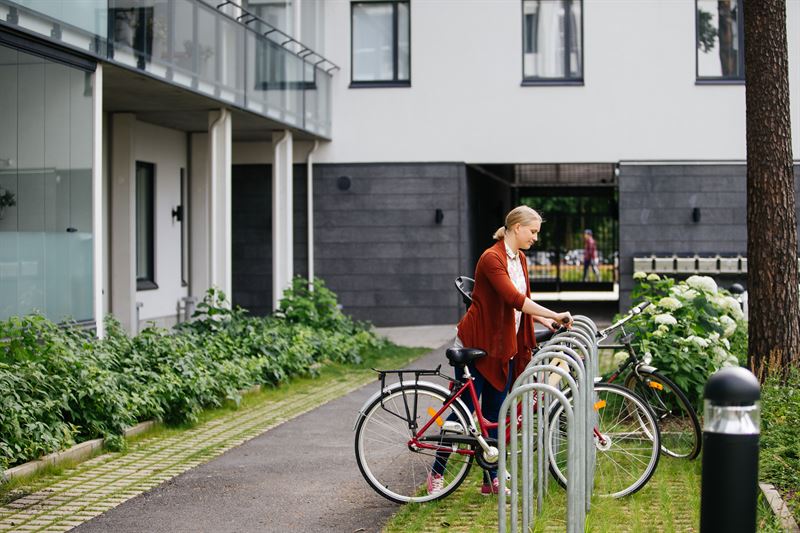Research: flexibility of owner-occupied housing is a draw
- Press Release
- 31.10.2018 08:00 CET
Study: city dwellers value functional homes – Generation Y also values newness
YIT CORPORATION Press release, October 31, 2018, at 9:00 a.m.

YIT’s Sustainable Urban Environments seminar will be organised for the sixth time this year.
For Finns residing in urban areas, the number of square metres and the sense of space (22%) are less important than having a home that is functional and makes good use of the available space (65%). This was revealed by the Sustainable Urban Environments 2018 barometer*, a survey of one thousand urban Finnish respondents conducted by YIT and Prior Konsultointi.
The Sustainable Urban Environments 2018 barometer, carried out in October, revealed what types of urban environments are valued in Finland. The participating city dwellers expressed their views on themes such as homes, working environments, urban environments, transport and retail. The results of the questions concerning the respondents’ homes clearly showed that all residents of urban areas—regardless of age, gender, life stage, location, form of housing and household income—value the functionality of a home more than the number of square metres of floor space it contains.
According to the barometer, the age of the home was the most significant among the respondents representing Generation Y, i.e. those between the ages of 18 and 35. The majority of them (60%) want to live in a new home and only one in five (19%) prefer an older home that exudes a sense of history. Generation Y also values newness when it comes to the working environment. Three out of five (60%) respondents in the 18–35 age bracket said they would rather work in brand new business premises than old and renovated premises (15%).
Dense construction favoured by residents of city centres, brick-and-mortar retail popular across the board
The results of the barometer indicate that dense and sparse urban structures both have strong supporter bases. Two out of three (68%) residents of city centres favour a denser urban structure. Those who live in city centres (58%) are more willing to support infill development in their neighbourhoods than those who live in sparsely built urban areas or suburban areas (42%), provided that infill development increases the area’s purchasing power and retail services.
Brick-and-mortar retail was rated as highly significant by all city dwellers. A clear majority of urban residents prefer to visit a brick-and-mortar shop (80%) rather than buy goods online (10%). Even in Generation Y, four out of five respondents indicated they prefer traditional shopping, which allows them to choose what they want to buy and receive the purchased items immediately.
Opposition to congestion charges and other restrictions on driving
According to the barometer, half of all city dwellers prefer to commute by car. The other half use public transport, ride bicycles or walk. The respondents who indicated the strongest preference for using their own car to commute were those who lived in detached or terraced houses, while those who live in apartments prefer public transport.
Respondents did not show support for restrictions on driving in the city. Even among Helsinki residents, only slightly more than a third (37%) support congestion charges or road tolls for drivers. In all groups of respondents, more people wanted to see an increase in the number of parking spaces than a decrease. Even among people who have no car in their household, a larger proportion wanted to increase (38%) the number of parking places than decrease (27%) them.
*Sustainable Urban Environments barometer 2018
The Sustainable Urban Environments barometer was implemented for the first time this year. The barometer aims to reveal the types of urban environments people in Finland value and wish to see developed. The survey is targeted at the residents of eight cities: Helsinki, Espoo, Vantaa, Tampere, Turku, Oulu, Jyväskylä and Kuopio. The data was collected by an online panel administered by CINT Ab during October 11–18, 2018. The number of respondents was 1,003 and the sample is representative of the 18–75-year-old population of the selected cities in terms of respondents’ age, gender and the size of each city.
The results of the barometer and the themes related to urban development will be discussed more at the YIT Sustainable Urban Environments seminar (November 1, 2018) organised for the sixth time this year. More than 200 decision-makers representing municipalities and the property sector have already registered to attend the seminar.
Urban development is at the heart of YIT’s strategy and business operations.
Media representatives are warmly welcome to attend the Sustainable Urban Environments seminar. Please register by October 31, 2018, by e-mail: heidi.kauppinen@yit.fi
Further reading:
On the Sustainable Urban Environments seminar
Interview with David Hejgaard, Regional Lead Nordics at Zalando
More information:
Heidi Kauppinen, Communications Manager, YIT Corporation, tel. +358 40 574 3170, heidi.kauppinen@yit.fi
Hanna Malmivaara, Vice President, Communications, YIT Corporation, tel.: +358 40 561 6568, hanna.malmivaara@yit.fi
YIT is the largest Finnish and significant North European construction company. We develop and build apartments, business premises and entire areas. We are also specialised in demanding infrastructure construction and paving. Together with our customers our 10,000 professionals are creating more functional, more attractive and more sustainable cities and environments. We work in 11 countries: Finland, Russia, Scandinavia, the Baltic States, the Czech Republic, Slovakia and Poland. The new YIT was born when over 100-year-old YIT Corporation and Lemminkäinen Corporation merged on February 1, 2018. Our pro forma revenue for 2017 was over EUR 3.8 billion. YIT Corporation's share is listed on Nasdaq Helsinki Oy. www.yitgroup.com



